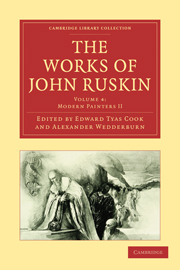Book contents
- Frontmatter
- Contents
- LIST OF ILLUSTRATIONS
- INTRODUCTION TO THIS VOLUME
- BIBLIOGRAPHICAL NOTE
- MODERN PAINTERS
- AUTHOR'S PREFACE TO THE RE-ARRANGED EDITION (1883)
- AUTHOR'S SYNOPSIS OF CONTENTS
- PART III OF IDEAS OF BEAUTY
- SECTION I OF THE THEORETIC FACULTY
- CHAPTER I OF THE RANK AND RELATIONS OF THE THEORETIC FACULTY
- CHAPTER II OF THE THEORETIC FACULTY AS CONCERNED WITH PLEASURES OF SENSE
- CHAPTER III OF ACCURACY AND INACCURACY IN IMPRESSIONS OF SENSE
- CHAPTER IV OF FALSE OPINIONS HELD CONCERNING BEAUTY
- CHAPTER V OF TYPICAL BEAUTY:–FIRST, OF INFINITY, OR THE TYPE OF DIVINE INCOMPREHENSIBILITY
- CHAPTER VI OF UNITY, OR THE TYPE OF THE DIVINE COMPREHENSIVENESS
- CHAPTER VII OF REPOSE, OR THE TYPE OF DIVINE PERMANENCE
- CHAPTER VIII OF SYMMETRY, OR THE TYPE OF DIVINE JUSTICE
- CHAPTER IX OF PURITY, OR THE TYPE OF DIVINE ENERGY
- CHAPTER X OF MODERATION, OR THE TYPE OF GOVERNMENT BY LAW
- CHAPTER XI GENERAL INFERENCES RESPECTING TYPICAL BEAUTY
- CHAPTER XII OF VITAL BEAUTY. I. OF RELATIVE VITAL BEAUTY
- CHAPTER XIII II. OF GENERIC VITAL BEAUTY
- CHAPTER XIV III. OF VITAL BEAUTY IN MAN
- CHAPTER XV GENERAL CONCLUSIONS RESPECTING THE THEORETIC FACULTY
- SECTION II OF THE IMAGINATIVE FACULTY
- APPENDIX
- Plate section
CHAPTER VI - OF UNITY, OR THE TYPE OF THE DIVINE COMPREHENSIVENESS
Published online by Cambridge University Press: 05 September 2013
- Frontmatter
- Contents
- LIST OF ILLUSTRATIONS
- INTRODUCTION TO THIS VOLUME
- BIBLIOGRAPHICAL NOTE
- MODERN PAINTERS
- AUTHOR'S PREFACE TO THE RE-ARRANGED EDITION (1883)
- AUTHOR'S SYNOPSIS OF CONTENTS
- PART III OF IDEAS OF BEAUTY
- SECTION I OF THE THEORETIC FACULTY
- CHAPTER I OF THE RANK AND RELATIONS OF THE THEORETIC FACULTY
- CHAPTER II OF THE THEORETIC FACULTY AS CONCERNED WITH PLEASURES OF SENSE
- CHAPTER III OF ACCURACY AND INACCURACY IN IMPRESSIONS OF SENSE
- CHAPTER IV OF FALSE OPINIONS HELD CONCERNING BEAUTY
- CHAPTER V OF TYPICAL BEAUTY:–FIRST, OF INFINITY, OR THE TYPE OF DIVINE INCOMPREHENSIBILITY
- CHAPTER VI OF UNITY, OR THE TYPE OF THE DIVINE COMPREHENSIVENESS
- CHAPTER VII OF REPOSE, OR THE TYPE OF DIVINE PERMANENCE
- CHAPTER VIII OF SYMMETRY, OR THE TYPE OF DIVINE JUSTICE
- CHAPTER IX OF PURITY, OR THE TYPE OF DIVINE ENERGY
- CHAPTER X OF MODERATION, OR THE TYPE OF GOVERNMENT BY LAW
- CHAPTER XI GENERAL INFERENCES RESPECTING TYPICAL BEAUTY
- CHAPTER XII OF VITAL BEAUTY. I. OF RELATIVE VITAL BEAUTY
- CHAPTER XIII II. OF GENERIC VITAL BEAUTY
- CHAPTER XIV III. OF VITAL BEAUTY IN MAN
- CHAPTER XV GENERAL CONCLUSIONS RESPECTING THE THEORETIC FACULTY
- SECTION II OF THE IMAGINATIVE FACULTY
- APPENDIX
- Plate section
Summary
The general conception of Divine Unity
“All things,” says Hooker, “God only excepted, besides the nature which they have in themselves, receive externally some perfection from other things.” Hence the appearance of separation or isolation in anything, and of self-dependence, is an appearance of imperfection; and all appearances of connection and brotherhood are pleasant and right, both as significative of perfection in the things united, and as typical of that Unity which we attribute to God, and of which our true conception is rightly explained and limited by Dr. Brown in his XCII.nd lecture; that Unity which consists not in His own singleness or separation, but in the necessity of His inherence in all things that be, without which no creature of any kind could hold existence for a moment. Which necessity of divine essence I think it better to speak of as comprehensiveness, than as Unity; because unity is often understood in the sense of oneness or singleness, instead of universality; whereas the only unity which by any means can become grateful or an object of hope to men, and whose types therefore in material things can be beautiful, is that on which turned the last words and prayer of Christ before His crossing of the Kedron brook, “Neither pray I for these alone, but for them also which shall believe on Me through their word; that they all may be one, as Thou, Father, art in Me, and I in Thee.”
- Type
- Chapter
- Information
- The Works of John Ruskin , pp. 92 - 112Publisher: Cambridge University PressPrint publication year: 2010First published in: 1903



